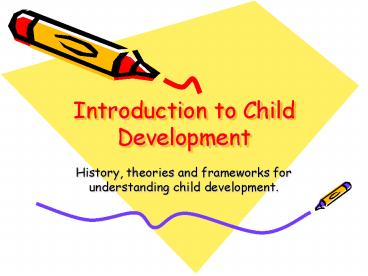Introduction to Child Development PowerPoint PPT Presentation
1 / 21
Title: Introduction to Child Development
1
Introduction to Child Development
- History, theories and frameworks for
understanding child development.
2
Areas of Development
- Physical development related to the body.
- Gross motor skills large muscles
- Fine motor skills small muscles
- Social development related to getting along
with and interacting with others. - Emotional development related to having and
dealing with feelings and emotions. - Intellectual/Cognitive development related to
learning and understanding the world around us.
3
Child Development is what happens when. . .
- A dependent new born baby develops
- Language, self-awareness, a personality, and
physical abilities, among other things - To become a capable independent young person
4
How it happens
- Certain aspects of development are very
predictable. - Around the world most infants and children do the
following at about the same time. - Development proceeds through a certain sequence
- Focus their eyes
- Sit up
- Learn to walk
- Begin to speak
- Develop logical reasoning skills
5
Same and Different
- Other aspects of development show more
variability or individual differences - Sociability
- Intellectual development
- Energy level, etc
6
Interrelated Development
- Areas of development are related. If one area is
growing other areas are as well. - Physical growth spurts are often mirrored in
emotional and/or intellectual growth
7
Why study children?
- Guidance for parents and other care-givers
- Helps society to support healthy growth.
- Helps identify and help children with special
needs - Contributes to self-understanding
- Understanding the influences and experiences that
shaped you
8
How we study children
- Theorists propose explanations for how children
grow and develop. - Focus on different aspects of development (moral,
physical, intellectual, etc.) - Theories based on observations and experiences.
9
Create a Theory of your own.
- Definition of a theory
- A proposed explanation or description of a
phenomena based on observations. From the Greek
theorein meaning to look at. - In small groups come up with a theory that
describes or explains some aspect of the
development of children.
10
Childhood throughout History
- Ancient Rome-Middle ages
- Little adults - Children infants until about 6,
then go work in the adult world - Children as property of fathers
- Children as sin-filled creatures in need of
guidance and salvation. - Strict discipline and neglect of special needs.
11
Childhood throughout History
- Renaissance Enlightenment
- Humanistic spirit appreciation for special
qualities of childhood - Children seen playing in art
- Childhood understood as a unique period of
development around 17th 18th centuries. - Tabula rasa child pure at birth, a blank slate
- Early experiences crucial to development of
childs character - Need to be protected from negative influences
- Calls for educational and social reform
12
Early Theorists
- John Locke children as a blank slate
- Jean Jacques Rousseau children as naturally
good, needed protection from evil influences. - Charles Darwin childhood understood through
human evolutionary origins. - G. Stanley Hall studied children through
interviews surveys
13
Sigmund FreudPsychosexual
- Personality develops in five psychosexual stages,
powered by unconscious conflicts among the id,
ego, and superego. - Nature, but Nurture also important
- Child passive in development
14
Erik EriksonPsychosocial
- Personality develops in eight psychosocial stages
through the life span. - Social relationships and conscious thought are
important. - Nurture, but nature also important
- Stages build on each other
- Child Active in development
15
Arnold GesellMaturational
- Development progresses through an orderly
sequence determined by biological maturation. - Ages and stages
- Child Passive in Development
16
Lev VygotskyCultural Historical
- The cultural, social, and biological are all
essential to development. - Scaffolding learning/developing with help,
support, and interaction. - Child active in development
17
Diana BaumrindParenting Styles
- Examined the impact of parenting practices on
childrens development. - Four parenting styles
- Authoritarian
- Authoritative
- Permissive
- Uninvolved
18
Jean PiagetCognitive Developmental
- Thinking and problem solving develop in four
qualitatively different stages. Assimilation,
accommodation, equilibration are important. - Nature and nurture important
- Child active in development
- He altered the study of children
19
Mary Ainsworth John Bowlby Attachment
- Studied the importance of early attachment
between infant and parent. - Evolutionary imperative of attachment.
20
Childhood, a crucial time
- Self-esteem developed in childhood
- A child who feels good about themselves is more
likely to be able to overcome problems later in
life. - Developmental tasks occur in succession.
21
Bibliography
- http//encarta.msn.com/encyclopedia_761557692/Deve
lopment_Child.htmls3 - www.kathimitchell.com/middleages.htm
- http//www.athealth.com/Practitioner/ceduc/parenti
ngstyles.html

